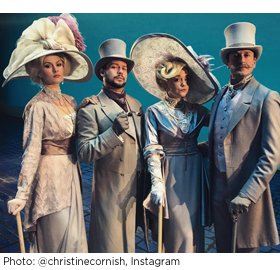The heat of summer brings numerous adjustments to actors, not least the challenges to their work brought about by air conditioning. How does artificially cool air affect their performance?
Some members of the My Fair Lady cast have unalloyed views on the subject of air-conditioning. “So long as it’s cold, I’m happy,” said Joe Hart, a member of the ensemble and understudy for the role of Alfred P. Doolittle. Liz McCartney, a member of the ensemble who understudies Mrs. Pearce, said, “I’m asthmatic and prefer air-conditioning.” (I’ve heard singers with dust allergies say the reverse, as air conditioning alters the humidity level of a room.)
For his part, Michael Halling, an ensemble member who understudies both Freddy Eynsford-Hill and Henry Higgins, found advantages in both the air-instilled cold of summer and the air-instilled heat of winter. “Cold can be good for comedy,” Halling said, “because a cool audience is more likely to be alert and laugh at the jokes.” He added, “On the other hand, it’s kind of nice when it’s hot and sweaty because there’s this feeling of primal crisis mode that you go into to get the job done.” As for the voice, Halling said that “it’s nice not to have too many extremes because the body reacts to those contrasts and you can get sick.”
Allan Corduner, who portrays Colonel Pickering, also takes a balanced view. “Air conditioning is a double-edged sword. Of course it provides welcome relief from the searing heat but it is terrible for health generally.” He added that both the artificial cooling of summer and artificial heating of winter “dry out the vocal chords. Humidifiers are gold!”
Harry Hadden-Paton, who plays Henry Higgins, agreed about the need for artificial moisture. “The heating on through the winter dries the voice out,” he said, and “I needed a humidifier and lots of steaming to counter the dry air.” Hadden-Paton isn’t bothered by July conditions, however. “The summer seems to be fine.”
If I found the consensus among My Fair Lady actors about air conditioning to be positive (they are, let’s not forget, in heavy period costumes and under bright lights), the views of the audience are likewise appreciative. With occasional reservations. As I mingle in the Vivian Beaumont lobby before matinees, I often hear patrons say something like: “I’m so happy to be out of the heat. But I never go to the movies or the theater without wearing long sleeves or bringing a cotton sweater. I want to focus on the performance -- not on whether I’m too hot or too cold.”
Brendan Lemon is the editor of lemonwade.com
